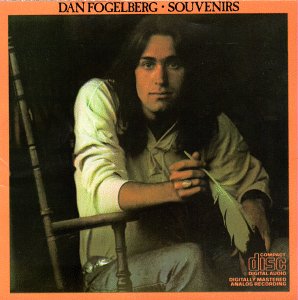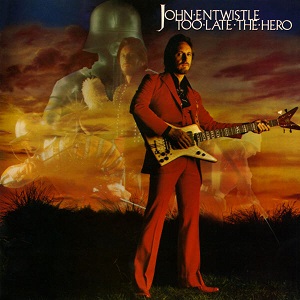
Chicago VII is the sixth studio album by American rock band Chicago. It was released on March 11, 1974 by Columbia Records. It is notable for being their first double album of new material since 1971's Chicago III and remains their final studio release in that format. It features session percussionist Laudir de Oliveira, who would become a full-fledged band member for the release of Chicago VIII the following year.

Barnstorm is the debut studio album by the American band Barnstorm, which was formed by guitarist Joe Walsh after he left the James Gang. The album was released in October 1972 on the labels ABC and Dunhill. It was the first album to be recorded at Caribou Ranch in Colorado.

The Smoker You Drink, the Player You Get is the second studio album by American rock guitarist and singer Joe Walsh, released in 1973 by ABC-Dunhill Records in the United States and the United Kingdom, and was also released in Germany. It proved to be his commercial breakthrough, largely on the strength of the Top 40 hit single, "Rocky Mountain Way", which helped propel the album into the Top 10.

So What is the third studio album by the American singer-songwriter and multi-instrumentalist Joe Walsh. It was released in late 1974 on ABC-Dunhill Records.

But Seriously, Folks... is the fourth studio album by the American singer-songwriter and multi-instrumentalist Joe Walsh. The album was released in mid-1978, on the Asylum label. It included the satirical song "Life's Been Good". The original 8:04 album version of this track was edited down to 4:35 for single release, and this became Walsh's biggest solo hit, peaking at No. 12 on the Billboard Hot 100.

There Goes the Neighborhood is the fifth solo studio album by the American singer-songwriter, multi-instrumentalist, and sometime-guitarist for the Eagles, Joe Walsh. The album was released in May 1981, by Asylum Records, three years after Walsh's album But Seriously, Folks... (1978).

You Bought It – You Name It is the sixth studio album by the American singer-songwriter and multi-instrumentalist Joe Walsh. The album was released in mid 1983, on the label Warner Bros., two years after Walsh's successful album There Goes the Neighborhood. It was Walsh's second and final studio album to feature George "Chocolate" Perry as producer.

Ordinary Average Guy is the ninth solo studio album, and its title track, by American singer-songwriter and multi-instrumentalist Joe Walsh. The album was released in mid 1991. It was Walsh's first album of entirely new music since Got Any Gum? in 1987, and his first solo album to be issued internationally by Epic following a four-year alliance with Warner Bros. Records in the United States and Canada. The album features Ringo Starr, Survivor's lead vocalist Jimi Jamison, and the drummer Joe Vitale from Walsh's former band Barnstorm. Vitale also sings the lead vocals on the final track of the album, "School Days".

Songs for a Dying Planet is the tenth solo studio album by the American singer-songwriter and multi-instrumentalist Joe Walsh. It was released in mid 1992, on the label Epic. Keen to re-establish himself after his ill-received 1991 album, Ordinary Average Guy, Walsh enlisted his former producer Bill Szymczyk. At the end of the track "Certain Situations," one can hear a Morse code message that says "Register and vote for me."

Souvenirs is the second studio solo album by the American rock singer-songwriter Dan Fogelberg. The album was released in late 1974, on the label Epic Records. The album reached No. 17 on the Billboard 200 in March 1975 and was certified double platinum by the RIAA. Joe Walsh produced the album and played on ten of the eleven tracks.

Too Late the Hero is the fifth and final solo studio album by the English rock musician John Entwistle, released on 23 November 1981 by ATCO Records in the US, and by WEA in the UK. This was his only solo studio album of the 1980s and his last album to chart. The album peaked at No. 71 on the US Billboard 200, making it his best-selling album and his only album to reach the top 100.

Middle Man is the ninth studio album by Boz Scaggs, released by Columbia Records in 1980. Scaggs hired members of the band Toto as session musicians and shared songwriting credits with them, returning to the commercial, soul-influenced rock of the latter. It would take him eight years to release his following album Other Roads, again retaining the personnel of the three preceding it.

Yer' Album is the debut studio album by American rock band James Gang. The album was released in early 1969 on the Bluesway label. This is the James Gang's only album to feature their bassist Tom Kriss. He was replaced by Dale Peters for their next album. The album is the first to feature guitarist Joe Walsh, who would later achieve success as a solo artist and with the Eagles.

Thirds is the third studio album by the American rock band James Gang. The album was released in mid 1971, on the label ABC Records. It is the last studio album featuring Joe Walsh. "Walk Away" was released as a single, making the Top 40 on at least one national chart, reaching #51 on the Billboard Hot 100, the best placement of a James Gang single. The album reached Gold status in July 1972.

Shot Through the Heart is the fifth album by American singer/songwriter Jennifer Warnes, released on Arista Records in 1979. It peaked at #13 on the Billboard Country albums chart and #94 on the main Billboard albums chart.

Friends and Legends is the second solo album by Michael Stanley. The album title refers to the backing musicians accompanying Stanley on the album, which was recorded at Applewood Studios in Golden, Colorado. The basic band on all tracks was Barnstorm, composed of Joe Walsh on lead guitar and synthesizer, Joe Vitale on drums, flute, synthesizer and backing vocals, and Kenny Passarelli on bass. In addition, three members of Stephen Stills' Manassas performed: Paul Harris on keyboards, Joe Lala on percussion and Al Perkins on pedal steel guitar, and the band also included saxophonist David Sanborn. Among the backing vocalists were Richie Furay and Dan Fogelberg. In keeping with the collaborative spirit, J. Geils assisted with production of the saxophone tracks.

Alive Alone is Mickey Thomas's 1981 album. After joining Jefferson Starship, Thomas was still under contract to record a second solo album. Alive Alone was released shortly after the Jefferson Starship album Modern Times, and Grace Slick's album Welcome to the Wrecking Ball!, but the Thomas album did not enter the Billboard chart.

Analog Man is the eleventh and latest solo studio album by the American singer-songwriter and multi-instrumentalist Joe Walsh, formerly of the James Gang and lead guitarist for the Eagles. The album was released in mid 2012, on the label Fantasy in the United States and the United Kingdom, It is also his first new solo studio album to be released since 1992's Songs for a Dying Planet, 20 years prior. The album features 10 new songs, and was co-produced by Walsh, Jeff Lynne, who also performs various instruments and backing vocals on the album, and Tim Armstrong from the punk band Rancid who co-wrote and plays guitar on one of the album's songs. The album also features contributions from the former Beatles drummer, Ringo Starr, the former Barnstorm members, Kenny Passarelli and Joe Vitale, former James Gang members, Jim Fox and Dale Peters, David Crosby and Graham Nash of Crosby, Stills & Nash and also a duet with Little Richard.

"Lady on the Rock" is a song written by Joe Vitale, Bill Szymczyk and Stephen Stills. The song was released in 1981 as a single from Vitale's second solo studio album, Plantation Harbor (1981), and reached number 47 on the Billboard Mainstream Rock chart. The track is titled "Lady on the Rock " on the single release.

Stone Alone is the second solo album by the Rolling Stones' bass guitarist Bill Wyman. It was released in 1976 by Rolling Stones Records. The album reached number 166 on the Billboard 200.




















